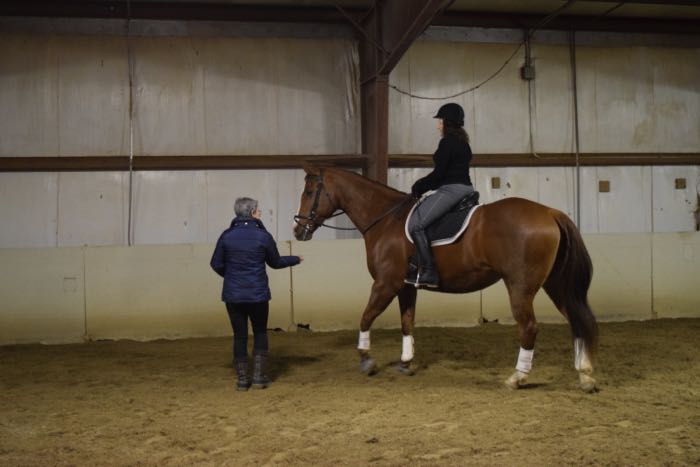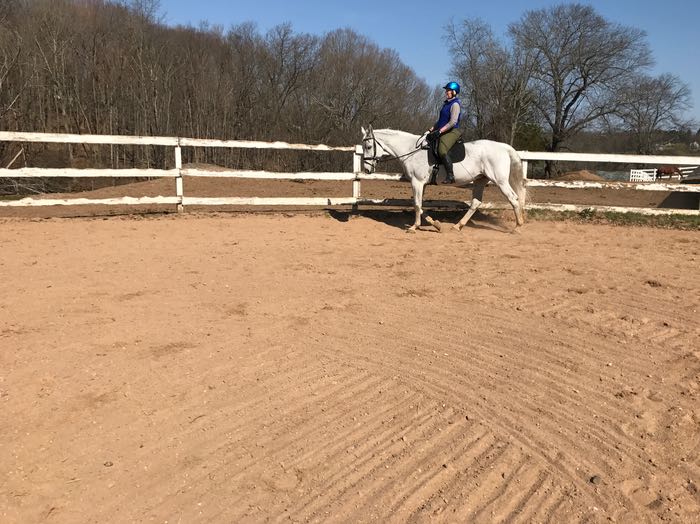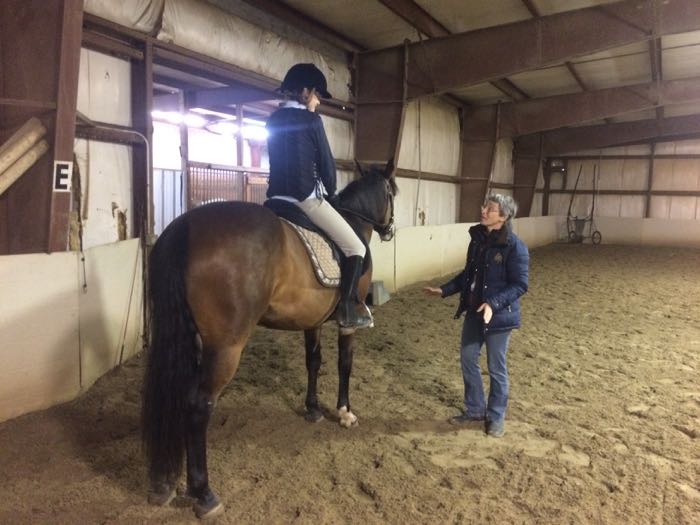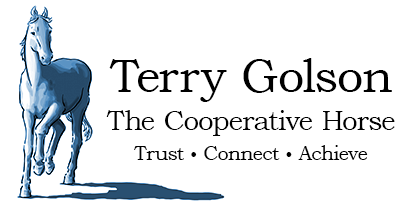I grew up in a family that treated any achievement as a step to the next, more important, thing. This has its benefits. The world is a more interesting place when you take on challenges. The downside is that you never feel as if what you do is enough. My entire life I’ve been trying to find that balance between living up to my potential and being able to enjoy the moment that I’m in. I’ve been thinking about how this applies to the teaching that I do.

Goals are a human construct. The horse doesn’t care a whit about ribbons, but that doesn’t mean that we should do nothing other than admire our horses from afar. Like humans, it’s best for horses to have physical exercise, and the more we ride, the more they get. Besides, your horse wants an interesting life, too, and training enables them to get out and do things. Train with clarity and kindness and your horse will willingly accompany you on that path to whatever goal you set, whether it’s journeying over hill and dale, competing at shows, or giving your grandchildren pony rides.
Setting an appropriate goal is not easy. I’ve had students bemoan the fact that they’re not as talented as their horses, and believe that they’re letting their animals down by not jumping big hurdles or moving up the levels in dressage. Again, the horse doesn’t care! I have a student who has a mare who is capable of dancing sideways at the half-pass, but right now in our lessons they’re doing simple twenty meter trot circles. That’s fine with both of them! As with so many of us, life got in their way of running down a straight line to a goal. Other instructors have made her feel guilty that she’s “not riding up to the horse’s potential.” But, honestly, who cares? These two have been a team for many years. They’ve been there and done that. Now the owner simply wants to get back into riding shape. The mare enjoys being out and about and having a dialog with her person. It’s enough.

This is how I think through goal setting – I ask, what level does the rider want to be at, and is the horse physically and mentally capable of going there with her?
I was recently asked what makes a good instructor. My answer circles back to the premise that I started with about growing up anxious that whatever I did wasn’t enough. A horse lives in the moment, and a joy of being in the saddle is letting your horse take you to that zen place – where you and your horse are of one mind and body. When there, past and present fade. A good instructor notices and celebrates those transcendent moments and then uses them as building blocks for whatever goal the student wants to reach. It turns out that you can simultaneously be good enough and still have more to do.

What is your training goal? What this is good enough moments get you there? Tell me in the comments.


[Not exactly on subject, but nevertheless…]
I remember having a long conversation with my son, when he was in his early twenties fresh out of university. The subject was Contentment vs Ambition!
My point was that, at any given time in your life, if you can’t find contentment in what/where you find yourself, the chances are, you’ll never be satisfied.
He argued that nothing would ever get done without ambition.
I said, but that could mean you’re always looking to the next move, rather than enjoying the place you’re in.
I’ve known other mums who are always waiting for the next step in their children, but missing the joy of what they’re doing right now!
Last year, near his 30th birthday, he avtually told me he could see my point!!!
Yay!
You were both right! Drive, ambition, and desire are all necessary for living a good, productive and fulfilling life (and helping others.) But being content and taking joy in the moment is also necessary. It’s a hard balance, isn’t it?
Yes, definitely a hard balance.
I’m a long-time reader from your chicken cam blog. But I love horses, too, so I enjoy CH very much.
I just wanted to tell you how much I enjoy your writing and photographs, and your very thoughtful, sensitive approach to life.
Thank you very much for sharing your life with the world.
-Shelley
Shelley, thank you for letting me know that you’ve followed me over here to my horse blog! I miss my HenCam community, so it’s wonderful to hear from you and know you’re still with me. (This is a not-so-subtle hint to my other HenCam readers to stop lurking and say hello!)
You’re a lovely writer, Terry. Just lovely.
Thank you, Tracy. This post seems simple, but it took me more than 6 hours to write. Worth every second because in putting it down, it helps me to clarify my thoughts.
I’ll take your hint to let you know I started out as a Hencam reader, in fact that blog got me motivated to get some chickens (hens) again. And The Cooperative Horse blog is right down my alley as I’ve had horses most of my life, and you can never learn too much about them.
One of my goals was to go to endurance races, but for various reasons I never got there. But that is OK, my husband and I started riding horses for other people to get them conditioned for trail rides and just generally get the horses used to things they might encounter.
That’s a wonderful niche that you and your husband have, and much needed! I would enjoy that work. Unfortunately, I don’t get called in until the horses are dangerous. So much better to have guidance from folks like you *before* the horses get fearful and develop scary behaviors.
Thank you for another beautifully written post! It is just so relaxing reading through these.
My goal is to event, but at the moment (what with uni), whenever I get on my Spanish mare, we get stuck on a trot circle to the right! Now I am able to accept that when I am able to turn properly to the right and help her bend, that is a ‘good enough’ moment. In time it will be a nice dressage test, then a nice course. For now, it is a nice corner, every now and then!
Other training goals include having a good recall, and smoothing out the ‘mare-ish’ moments in her box. Again, I am content with the building blocks that are her being calm and neutral in response to “Nicely!” and coming over to the gate when I go to catch her… when she feels like it!
Giving yourself to do other things, and just enjoy our animals with the time that we do have is so important to having horses in our lives longterm. I wasn’t that smart in my twenties, got burnt out and had to take a total break before I could ride again. It sounds like you’ve figured out how to stay sane. Brilliant!
I followed you from years of reading Hen Cam to here and still read every post with pleasure. I now have nine bantams in my flock and I learned so much from you during Hen Cam. I have never had a horse but did ride a bit in my teens. I have learned so much about horses from you and continue to enjoy learning new details from you.
I like goal setting! I use positive reinforcement training so I learned to train with the end (goal) in mind before training in order to chunk it down in achievable steps to reward the horse. One tool I always include in goal setting is start with a list of accomplishments! In this way you give the student the feeling of a head start instead of ‘today we start with goal setting and we start from scratch’. This list (and a journal) is a good tool to use when one gets stuck in a rut.
I like that you say that the horse is not into goals. I don’t think a dressage horse or a ‘jumper’ will miss their ‘job’ if they can’t compete or ride daily. I think horses are happiest with… horses. 🙂
Agree that the horses don’t necessarily have our goals, but I do think that they do like the physical activity, the interaction, and the mental stimulation that comes from riding and training. I know that my horse heads out eagerly onto the trails, and when he knows that my dressage trainer is here to give us a lesson, he puffs up a bit, ready to be challenged.